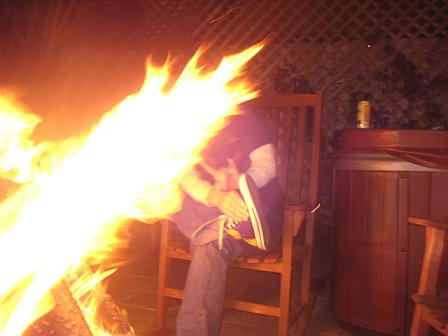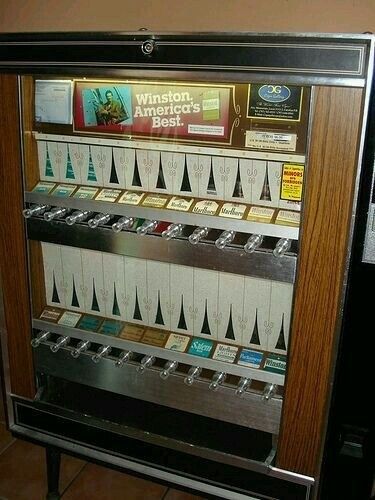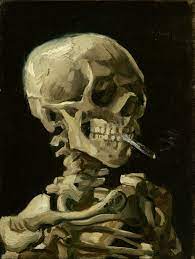It continues to be a joy and honor to have my work appear –alongside so many excellent writers– in Exterminating Angel Press. The theme of this issue is “Origin Stories,” which provided an opportunity to organize some indelible memories from my years in the service industry –ranging from fast food cashier to bus boy to waiter– and three distinct bosses, any of whom I’d do just about anything to check in with today (Lisa, Bruce, Steve, where you at?). Sending out a huge blast of karma to these folks, all of whom made the time in an often ignoble and unsavory environment memorable and, at times, pleasurable. Shout out (and RIP) to Church’s Fried Chicken, The Blue Channel Inn, and Paolo’s Ristorante.
i. 1985
First off, you have to understand: this was a job—and a time, and place (what older generations call a different time, and that’s hardly the half of it) when the words dark meat combo, or de-greasing pipes, and especially cutting up the raw meat were not sexual innuendo or double entendre, no matter how much, in hindsight, some of us might like them to have been. No, this was minimum wage work, an era when three and thirty-five was hourly compensation a high school kid could be proud of, saving it up cent by cent for cassettes and the relief—or at least variety—of other fast-food fuel. The type of coin, say, a sophomore makes, too young to use it as beer money, but too old, already, to count on allowance and the egg-shelled innocence that enabled.
Wanting beer and needing sex, very ready and willing but entirely unable to figure out how to sneak past second base; boners and bad dreams and unrealizable aspirations the fields of acned fire where a typical teenager makes his fruitless foxholes.
And speaking of foxes, the general manager, Lisa P., young enough to not be a shadow of the self she never had a chance to become: mid-80s affect and bangs, but mostly that body, creating equations even ardent Playboy aficionados understand, like Euclid with his gospel of rooted squares and straight lines. Lisa P, the community college drop-out who, a decade before or after, would never find herself in this time-warped wasteland, free market flypaper stuck to the wings of broke angels with bills to pay.
Speaking of wings (and thighs and breasts), even amidst hazy waves of grease and the grenade bursts of spiced powder, louder somehow than the hiss of hot oil christening wet meat marinated in a not-so secret recipe, the instinct driving the horny, half-track mind of a boy—with one eye on his learner’s permit and the other staring down at the unsightly (and always ill-timed) bulge behind his zipper, straining like a space shuttle, ready to explode immediately upon take-off—was this need, no this want, no this desire, no, something else that falls between fantasy and the four-letter word that also begins with F.
Here’s the thing. She felt it too, and all but intimated it could happen, anytime, calling the shots as she did. Also, she drove a Jeep and what a turn on: bumming rides all summer, the humid air doing more than soap and water to wash away the scent—and shame substitute—of a six-hour shift. And how real she kept it, her six-pack each night for the too-long commute home, sipping from a straw because breaking a tooth was a bad look in a business without dental insurance.
She was the boss, but it wasn’t sexual harassment and it wasn’t straight-up seduction; it was better: the tension of insecurity and angst, all those juices that flow when you’re out of your league but it’s still within reach, whatever it is. (Or shouldn’t be?) She knew enough to know you were already becoming something…not better, but an eventual college freshman and worse, a frat boy, the future some magic carpet guiding you to the types of futures a father’s checkbook can create. And so, she never asked more than once if you wanted one more beer before releasing you to your bedroom fantasies (and it’s right here in front of you, she never said), instead of stopping in a parking lot for some private lessons you couldn’t learn in (or outside of) school. She respected herself, and whatever it was you could become if she left you alone; a boost for your confidence but not a crisis (what happens when a fifteen-year-old falls in love with a woman he could never bring home to his folks, she made sure you never found out).
And if you didn’t understand or appreciate this, then, you do now, and owe it to her to offer some type of tribute to the past that did (and, since there’s two sides to every story, didn’t) happen, and hope that karma—like a fresh cut fried to perfection—is money in the register, waiting for the right time to pay back debts earned in advance.
ii. 1987
Believe in God?
You didn’t even like The Boss when I first met you, back when Born in the USA made you break out in hives, you insisted.
Only B.S. I’m trying to hear is Black Sabbath, you swore, the certainty of an older brother not by birth, the refusal to suffer the foolishness of Top 40 or anything any priest or politician said.
Teachers too, you warned. I know you plan to go to college but be careful about those mind-fuckers, all of them allergic to an honest day of work.
Unlike you (you implied), with your kitchen whites and black boots making their blue collared statement. Put any of them in front of this grill and they’d wet their pants. The pride and prejudice of a kitchen grunt, a baked-in scorn for everyone you served, especially the front of the house—who had to shave each shift and wore cologne like gay bohemians in some French bistro. I too would have been a sworn enemy on sight, a bus boy who didn’t mind sporting some Old Spice on occasion, but we spoke the same inscrutable language—the one found inside the grooves of 70s LPs.
1967 was the peak of civilization, we agreed and anyone dumb enough to enjoy Top Gun or believe Oliver North was a sucker, a sellout, or worse. I never admitted I envisioned law school and an imported convertible blowing a silk tie over my shoulders as I cruised home from the court room, somewhere in California, almost certainly. With Led Zeppelin cranking from the cassette deck, which was all that ultimately mattered, we knew, in our eyes and especially our ears.
Ours was the kind of friendship certain males have, bolstered by a mutual love of beer and music. You saw yourself in me, you said, and I understood. It’s not that I saw the same so much as I hoped I’d inhabit your insouciance. I couldn’t understand the glow of this certainty that attracted me, like a moth, even as it would burn me if I got too close; if its heat got under my thin, well-kept skin.
We saw the Moody Blues, already an oldies act but a living connection to the lives we missed in real time. The show was shambolic but I bought a T-shirt anyway, a statement to make amongst the flat tops and Top Siders I navigated around each weekday, a minefield of male aspiration and entitlement.
You smoked weed like you were exterminating evil spirits deep inside (and for all I knew, you were). The emanations of your habits, either a halo or else disinfectant for everything boring and banal. I saw you as an original, not yet old enough to understand you were rejecting alternate realities you’d been denied. I was still young enough to believe in the American Dream, unaware it was an RSVP sent only to those already running a tab.
This was an era where everyone drank the same beer but smoked a different brand. And everyone smoked. In other words, it was the opposite of today, aesthetically. Marlboro Light, the Top 40 of cigarettes, the Muzak of vices: for people who liked their nicotine the way they liked their beer or food or art: watered down, safe, predictable.
Speaking of unpredictability, I came to work one day and you didn’t.
Questions: where did you go and why did you leave and what are you doing and how did you get there? Where do people like you see themselves in five years when they live in five-hour increments, punching the clock until they punch out, permanently.
Prediction: you never found yourself pulled out, in pieces, from under a car or setting up shop at some unsavory street corner—purgatory with a paper cup—where anyone who knew you pretended not to see. Not that you were staying in the same city for too long, running because that’s what people like you do when they’ve run out of money, run out of friends, run out of options. Just like those gods from a different time we worshipped and hoped to become, you never realized the best years had already happened, like them you never saw it coming. And maybe you took it in a stride you learned to accommodate, obliged to live and bear witness in battles few others are made to fight. Alone everywhere in the world but willing to endure, one drink, one smoke, one setback, one more experience that will drive lesser sorts insane, at a time.
iii. 1994
When I lucked into my first so-called real job I got in the habit of referring to the time—admittedly too long—spent in the service industry as the bad old days. It wasn’t because I had no fun (I did) or that I thought there was any future in it (I didn’t). But it was, and remains in my memory, a scene with so many lives on a fast track to nowhere, where certain people fail to understand where they are, and where they’re not going.
And when I think of the place some people never find a way to leave, it makes me remember one person in particular: Izzy. That, of course, was not his real name, but it was what everyone called him. When he and I first met I would have sworn he was in his mid-forties, but in fact he had only recently turned thirty-something. Not old in the nine-to-five arena but ancient in the restaurant business. A lifer who’d never been promoted to general manager, he was a satellite drifting through the soiled orbit of a franchised business. He was never handed his own place to run, and he seemed entirely satisfied with that arrangement. In fact, as I came to see for myself, he counted on being an assistant behind the scenes, the hardened soldier who could close up shop and count the checks. We were often the last two left, hours after the final customer had called a cab or rolled the DWI dice. After a shift that started at 4 PM Izzy would set up camp in the sweltering office in the back of the kitchen, going about the unexciting but excuses-free business of book-keeping.
When Izzy showed up for his shift the following afternoon he always looked like someone had scraped him off the bottom of a greasy skillet. Red eyes blurred, his neck shrieking in silent agony from the burn of a blunt razor, the cigarettes and coffee escaping in sluggish waves from every inch of his sagging skin. Head bowed not in deference but disdain of the daylight; he could scarcely formulate the words being signaled from bruised brain to long-suffering lips. He would step up to the bar, shake his head and ask me to call him an ambulance. Then he’d disappear into the men’s room for a minute or two, emerging like a televangelist with a badly ironed shirt. He could barely tie his shoe, but after his magic act in the crapper he would be ready to plate a thousand entrees and run laps around the building in his wingtips (managers who wear comfortable shoes are never taken seriously, but they don’t realize until it’s too late it’s not because of the shoes).
For the next eight-to-ten hours, in between return trips to the powder room (occasionally he may have even used the toilet), Izzy was constant, awkward motion. All the waiters were in awe of him and all the waitresses were repulsed by him (especially the ones he had slept with). Izzy could sweat out more alcohol in a single shift than most of us could drink in an entire weekend, and he never missed a day of work during the two years I knew him. Even if you didn’t catch him ducking into the bathroom you always knew he had recently refueled because he would suck his teeth like someone trying to extract snake venom. The lip smacking and teeth licking were, to me, the black and blue collar stage of development between rock star and burnout, the line so many in the service industry straddle before they get out or go under.
None of this fazed me, which isn’t to say it was not unsettling, but grunts in the trench don’t offer advice to their sergeants, so I mainly focused on my own unsavory habits. But I could never figure out how Izzy, when he retreated to the office each night to match receipts, guest checks and time sheets, was able to polish off an entire bottle of peppermint schnapps. When he finally went home, closer to sunrise than midnight, that bottle he took back with him would always be empty. At first I figured he was trying to impress or even intimidate me (full success on both fronts), but after months of the same scenario, I had no choice but to acknowledge that his appetites and obsessions had, at some point, evolved from unhealthy to superhuman. That bottle was not something he wanted, and was no longer something he needed; it was simply something that he required, along with the bathroom breaks and the air his lungs inhaled. I worked dozens of shifts where I didn’t see him eat a scrap of food, but he never went into that office without his bottle of schnapps. And at least once a week he’d arrive at work with fresh bottles he kept to stock the bar. I could never fathom the physics, or biology (or algebra) that enabled a man to drain a fifth each evening and still function, but I also learned the hard way in high school that some subjects would, for me, remain forever mysterious.
By the time he took his transfer to the next location (never a demotion but never an advancement) he looked like he could collect social security. How long can that lifestyle sustain itself? I asked myself, then, and ponder it now. Where is Izzy today? Is he in an assisted living facility somewhere, or at the bottom of a river? Will I find him patrolling an intersection one night, not embarrassed to ask for tips after all these years? Or did he take the hard way out and start a family; his bad habits replaced by baby bottles, dirty diapers and manicured lawns? Or most likely and equally unsettling: has he subscribed to an altogether different sort of salvation, whacked out of his skull with sobriety?
*Some elements of this last section appear in my novel NOT TO MENTION A NICE LIFE.



